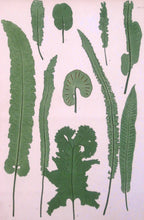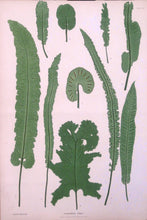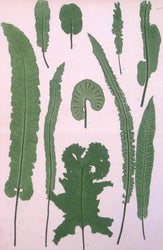Henry Bradbury. Plate 42. “Scolopendrium vulgare.” From Thomas Moore’s British Ferns.
London: Bradbury & Evans, 1855. 21 x 14 (paper). Nature printed intaglio prints. Printed in colors. Full margins. Very good condition.
A print from an unusual group of prints that used the rare process of ‘nature printing.’ Nature printing is not a single process, but includes any process where actual plant specimens are used to make prints. The earliest known attempt at nature printing was by Leonardo da Vinci who printed images of plants by inking the plants and then pressing them by hand onto the paper. This process was used infrequently into the eighteenth century, but proved unsatisfactory due to the problems of getting uniform impressions and wear on the plants, the latter of which extremely limited the number of prints.
In the nineteenth century a new method of nature printing that was more successful was developed in London and Vienna. The plant was not used directly to make the print, but instead was used to make a metal plate. This process involved laying the plant to be illustrated on top of a plate of soft lead. The plant was then covered with a hard steel plate, and this sandwich was run through an intaglio printing press. The pressure forced the image of the plant into the soft lead, and this impression was transferred to a copper plate by electrotyping and a reverse plate made from that for printing.
There are very few examples of nature printing in the history of botanical prints, and Bradbury’s ferns are probably as fine as any. Not only was Bradbury’s process a success, but ferns lend themselves nicely to this process. Each print precisely and delicately traces the image of the plants, capturing the detail of nature itself almost ‘first hand.’ Besides their considerable historic interest, these prints are most attractive.





